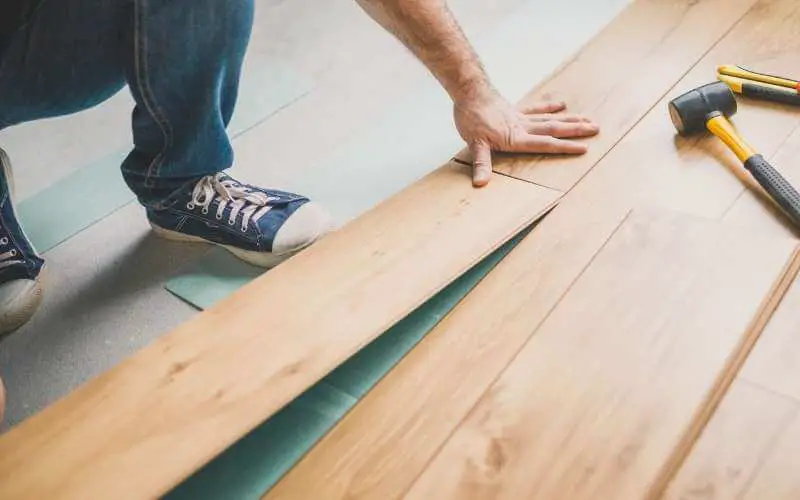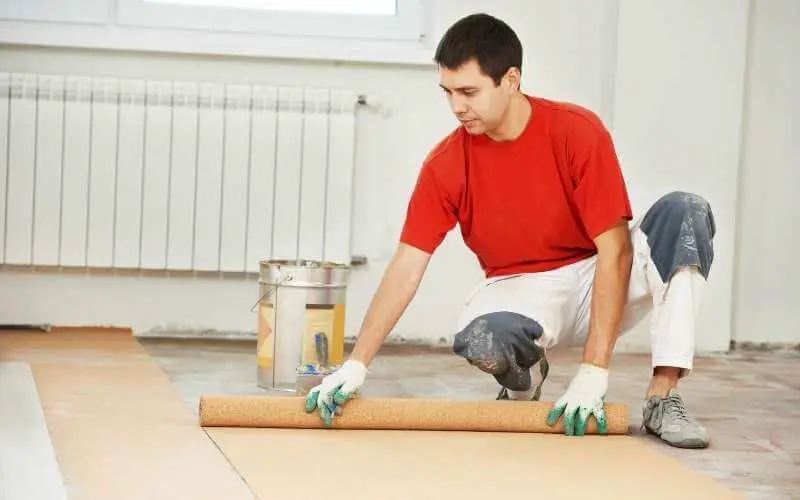When it comes to flooring, choosing the right installation type helps to uplift the look of the room and ensures the flooring lasts as long as it should in the environment it was installed.
The right method for you depends on a couple of factors like the intended environment of installation, the interior design approach, and, most importantly, your subfloor.
The particular type of subflooring you have underneath existing or previous flooring (the most common being concrete) determines the suiting installation process to use in.
To give you a better understanding, let’s illustrate the comparable characteristics of glue down vs. floating floor on concrete, so you can decide which is right for you.
Related: Advantages and Disadvantages of Floating Floors
Glue Down vs. Floating Floor on Concrete
Table of Contents
What Is Glue Down Flooring?
Glue-down flooring has an adhesive side that is laid facing the subfloor. There are two types of glue down vinyl flooring: hard set and pressure-sensitive.
- Hard set adhesives are best used when installing glue-down flooring in areas where heavy items such as furniture are placed. Spread the adhesive on the plank and press it unto a level subfloor to secure the plank firmly. The flooring planks installed with this adhesive maintain stability and can handle the weight without indenting or breaking.
- Pressure-sensitive: This is a much more versatile type of adhesive that is more commonly used in commercial areas like retail and hospitality spaces, where there tends to be a frequent change of flooring in shop fit-outs because the adhesive is much easier to replace.
Advantages of Glue Down Flooring
They Hold In Place Longer
Glue-down flooring is very durable, especially when a hard set adhesive is used. The planks can hold in place for years with little to no peeling, so you do not have to worry about changing your flooring earlier than you would like. The durability of the flooring is also impacted by how well the floor is installed.
Easier To Repair And Replace
Compared to floating floor planks interlocked together (they are discussed in-depth in a bit), repairing or replacing glue down flooring planks are way easier. You can fix or replace a faulty plank or tile without having to pull up the nearby planks.
Affordable
Glue-down flooring costs less than its floating counterparts, and because there are easier to install and replace, you can cut down costs and carry out the installation yourself. Hard-set vinyl adhesive is less expensive than pressure-sensitive, and if you are saving some bucks on installation costs, you can get high-quality planks or tiles.
Problems With Glue Down Vinyl Plank Flooring
More Effort And Time Consuming
Installing glue down flooring requires more time and effort compared to other flooring types. You would need the subfloor to be completely even, as a slight dent or imbalance on the subfloor can ruin the entire installation. The adhesive can be applied to the flooring using a trowel but must be spread out evenly, covering the entire flooring.
What Is Floating Vinyl Plank Flooring?
Floating flooring is commonly used in commercial areas and residential buildings as well. There are two different types of floating vinyl options: loose lay and click vinyl flooring.
Loose Lay Vinyl Flooring
Loose lay flooring does not need any adhesive or fastener during installation, and the exact installation procedure for loose lay flooring differs depending on the flooring manufacturer.
But generally, start the installation of loose lay flooring by attaching or gluing down planks or tiles on the room’s outer edges to hold up the rest of the flooring installed in the middle.
The tiles laid in the middle stay intact and are sustained by the tiles or planks glued down along the room’s perimeter.
Read: Flooring Options For Dirt Basement Floors
Click Vinyl Flooring
Click vinyl flooring is more common than the other type of floating floor due to its stability and sound suppressing quality.
Click vinyl flooring is also known as luxury vinyl flooring; they have planks with a rigid core and feature a groove and lock means of installation, so each plank is locked in easily, and the entire flooring is installed in a breeze.
What Is The Advantage Of a Floating Floor
DIY-Friendly Installation
Installing floor planks with the click and lock or lose lay mechanism is very easy to undertake as a DIY project.
With a few handy skills, you should be able to install floating vinyl flooring without breaking a sweat!
Well, installation of floating vinyl flooring is absolutely fuss-free, although you may break out a few sweats, either way, you do not need to get the subfloor completely leveled before installing the planks, and they sit firmly and even on top of the subflooring.
Durable
Floating floor planks are available in different thickness sizes ranging up to 6mm. Their thickness increases their durability and helps the planks last a very long time and retain their stability and noise-reducing quality.
This gives the floating floor an edge over glue-down vinyl flooring that can begin to peel after being used for too long.
Peeling is a rare occurrence with floating floors, and the planks will rarely come apart if installed correctly. Floating flooring is also usually waterproof.
Disadvantages of Floating Floors
Repairs are Tiresome
Floating flooring is interlocked together; this makes fixing damaged planks quite challenging. The interlocking mechanism of floating vinyl plank flooring causes repairs to be quite difficult to carry out.
If any plank gets damaged, fixing it would require you to pull up the planks surrounding the damage to remove the damaged plank.
So although floating flooring planks are sturdy and long-lasting and do not get damaged easily, you would have a big job on your hands should in case this type of flooring needs repairs.
Cost
Floating vinyl plank flooring is on the high-end in terms of cost compared to all of the other vinyl flooring options.
However, this does not make them off-range, and when their durability and other excellent benefits are considered on a long-term basis, it makes floating floors more affordable than other flooring types that are initially cheaper to purchase and install but gets damaged and need replacement more quickly.
Read: Should you Float or Glue Engineered Wood Floor
Conclusion
Following the similarities and differences highlighted in the scale, glue down vs. floating floor on concrete which is best? You get to make the right choice on the type of flooring that holds up well in your space.
On a surface level, glue down and floating flooring only follow differing installation procedures, but this impacts their durability and how well they hold up the weight.

